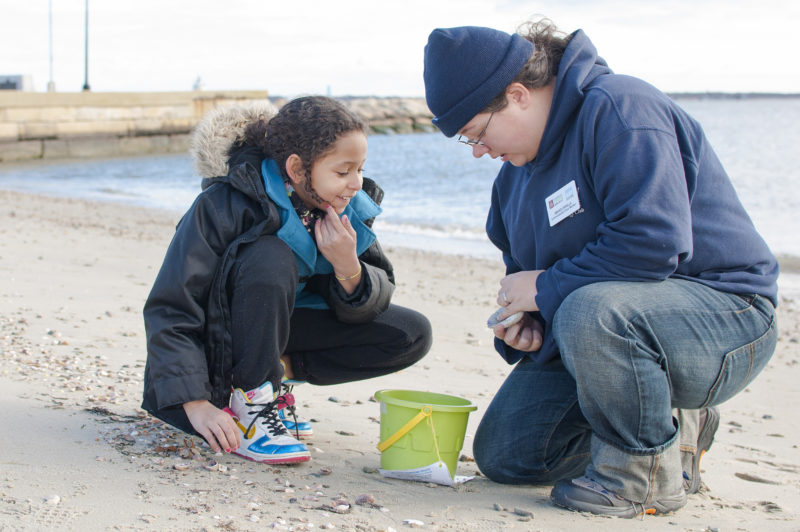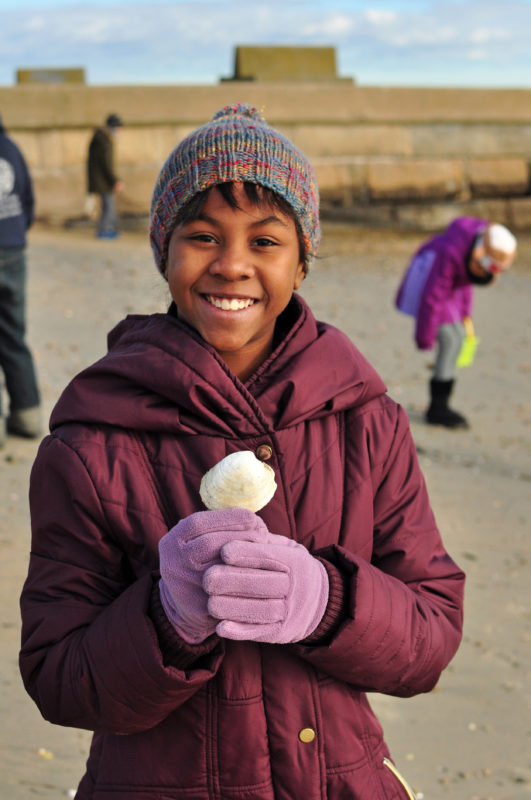Three-year “B-WET” grant will fund outdoor exploration for New Bedford students
On a cool day last spring, Coalition Outdoor Exploration Coordinator Rebecca Vasa stood in front of a group of New Bedford fourth graders at the Sea Lab Marine Science Center and asked a seemingly simple question: “Who here has visited Buzzards Bay before?”
Without fail, whenever Vasa asks her Sea Lab students this question, only one or two students raise their hands. The fact is, most of these students have been to many locations around Buzzards Bay — but they have never truly connected their local beach, pond, or stream with Buzzards Bay, or with the marine ecosystem right in their backyards.

Beach walks through the Sea Lab program are a great way for students to discover life at the beach.
Thanks to a new grant from the National Oceanic and Atmospheric Administration (NOAA) B-WET program, the Coalition will have the funding to continue and expand programs that immerse New Bedford students – both literally and figuratively — in Buzzards Bay. The grant will help the Coalition continue to deliver programming conducted with Sea Lab, which takes every fourth-grade class to explore the shoreline of New Bedford’s East Beach and learn about the plants and animals they find. Last year, 1,251 fourth and fifth graders got to tap into their natural curiosity and spend more time learning outside with the Coalition through Sea Lab.
Previously, the Coalition only saw each classroom once per year for shoreline exploration. The B-Wet grant will expand the connections made at Sea Lab by funding additional outdoor exploration for these students at the Acushnet Sawmill, and allow some student groups to venture across Buzzards Bay to explore Cuttyhunk Island.
“This grant is allowing us to have additional contact with these students, and to make strong connections through multiple experiences,” says Vasa. “Doing this will help us achieve that personal link to the Bay, and really enforce how important it is to care for it.”

The Coalition’s expansion of the Sea Lab program will enable kids to get outdoors on Cuttyhunk Island and at the Acushnet Sawmill.
Follow-up stewardship and community outreach projects, including opportunities for students to help at the Coalition’s annual Acushnet River Herring Festival, will help further their connections to Buzzards Bay throughout the school year. Overall, the grant will allow the Coalition to reach over 850 fourth graders, as well as 150 fifth graders who will build on their fourth grade experiences.
Connections with the natural world are particularly essential in places like New Bedford. Outdoor recreation has long suffered from an “adventure gap” that excludes minorities and the economically disadvantaged. The Massachusetts Department of Elementary and Secondary Education considers 66.1 percent of New Bedford students economically disadvantaged, and 60.2 percent are minorities. In some cases, Sea Lab programs are the first time children have ever explored nature in their own city.
This disconnect between children and the natural world has ramifications that may also carry back to the classroom. New Bedford students fall 17 percent below the state average in science and technology proficiency.
As such, Vasa says, the grant is a win-win for all: “It’s expanding both our capacity to reach youth, and expanding students’ view of the Bay.”